Best Soil For Cannabis - What is Good Soil For Growing Weed?
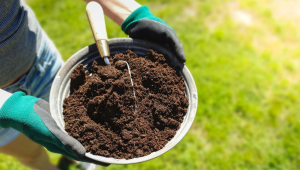
- 1. The benefits of organic soil
- 1. a. Organic soil additives
- 2. Other additives that improve soil quality
- 2. a. Coco
- 2. b. Biochar
- 2. c. Perlite
- 2. d. Vermiculite
- 3. Signs of good soil
- 4. Signs of bad soil
- 5. How to make your own soil
- 5. a. Best nutrients for soil
- 5. b. Cheap mix for diy soil
- 5. c. Best soil for beginners
- 5. d. Ph too high or ph too low
- 5. e. Best soil for marijuana
- 6. In conclusion
When growing autoflowering Cannabis plants, it is very important to keep them supplied with nutrients in the form of hard foods, or liquid feeds. The best soil for autoflowers will depend on your environment, fertilizers, and ability to control the pH, so keep this in mind if this is your first grow cycle, knowing the best option in your case can really set you on your way to bountiful harvests. In this article, we’re going to walk you through everything you need to know about soil when it comes to growing cannabis successfully. Most growers look at soil through the lens of chemistry. What does this mean? Well, people fall into the trap of looking at soil as nothing more than a mixture of three substances: Sand, silt, and clay. These three fractions of the soil determine the texture of a particular growing medium. As well as structure, many contemporary growers are concerned with the chemical ionic nutrients that they proceed to add to the growing medium. These compounds, including the macronutrients nitrogen, phosphorus and potassium all enable cannabis plants to function properly on a physiological level.
Adding the correct amount at the optimal time will result in a rewarding outcome of trichome-rich and resin-coated cannabis flowers. However, soil contains much more than sand, silt, and clay fractions. Soil organic matter also makes up a crucial part of any healthy soil and contributes towards vibrant and productive cannabis plants. Soil organic matter is defined as the organic component of soil, which includes plant and animal detritus at varying stages of decomposition. Essentially, it’s the mulch, compost, dead plant matter, or manure that you add to your soil. All of these components contain valuable nutrients that are eventually broken down into plant-available compounds. While bottled ionic nutrients feed plants in the short term, soil organic matter helps to build healthy soil and builds a long-term bank of nutrients that will benefit plants for growing seasons to come.
Soil organic matter also includes another vital and important component: Microorganisms. This umbrella term includes many different species of bacteria, fungi, protozoa, and other creatures. Although small (microscopic, in fact) they play a vital role. Soil microbes release enzymes that break down plant and animal detritus. They are the engine of the soil and eventually transform mulches and compost into nutrients that drive the growth of your valuable cannabis plants. They facilitate nutrient cycling in the soil. You won’t find a thriving forest system in nature that doesn’t rely on these important life forms. So if you're wondering what soil is best for growing weed, below we'll explain what to know, the signs of good and bad soil quality, as well as what you should consider when it comes to planting this year.
1. The Benefits of Organic Soil
Soil for autoflowers or for any other type of cannabis plant consists of organic material that is in a permanent state of decomposition. Teaming with beneficial microorganisms that are responsible for converting nutrients to the plant’s roots, living soil is Mother Nature's way of allowing autoflowering plants to work in a symbiotic relationship. As the tiny microorganisms decompose the organic matter, they make the nutrients available for the roots, which are now able to access all the available nutrients and minerals found within the soil web. Once this symbiosis occurs, then the only real requirement is for the soil to be adequately watered. This is basically the most simple form of organic growing that is perfect for those new to growing, it requires very little maintenance, and labor, as well as allowing the grower to work with a slow buffering organic process, so if you were wondering what is the best soil for growing weed, read along.
Before we delve into the ins and outs of organic soil, we need to cover the opposite. What makes soil non-organic? The definition of organic agriculture involves the growing of crops without the use of chemical fertilizers, pesticides, and other artificial chemicals. By abandoning these modern practices, organic farmers turn their attention towards natural methods that help plants to thrive and keep delicate soil food webs intact. If you’re wondering, the soil food web refers to the complex web of microbial life that occupies the soil. Instead of a food chain (a word you’re probably familiar with from biology class), a food web operates in a more complicated way. They involve many different chains that are all connected together in a web-like structure. Ultimately, these systems are responsible for cycling the nutrients in natural systems.
Organic farming and gardening use techniques that help these systems to thrive. These methods include mulching, applying natural fertilizers such as seaweed, and compost teas that apply microbial populations directly to the soil and the surfaces of leaves. In contrast, conventional chemical farming actually damages the soil food web and makes farmers and gardeners much more reliable in adding chemicals in the future. Without the beneficial life in the soil, growers have no other choice but to add chemicals to enable their plants to survive. Chemical fertilizer salts damage soil life in numerous ways. For one, they give plants exactly what they need, which makes them less dependent on the organisms in the soil. In turn, they shut down their relationships with beneficial fungi and bacteria, which eventually die off. These chemicals also harm valuable nutrient cyclers, such as worms, that are known to boost the yields of various crops, aerate the soil, and boost soil drainage. Furthermore, chemical agriculture also relies on harmful chemicals such as herbicides and pesticides to fight off pests and diseases. While these products work in the short term, they destroy beneficial soil life, kill beneficial insects, and pollute the growing space and the environment beyond. Of course, these chemicals also leave residues on the crops when they are applied to. In the context of cannabis, this equates to buds that have traces of chemicals that you certainly don’t want in your lungs.
Organic Soil Additives
Using organic soil additives or amendments will help increase the number of beneficial microorganisms, improve moisture retention, and help you control the health of your soil. In general, you should be looking at adding these amendments before planting. They will help you create the best organic environment for the root system to thrive, which will result in amazing growth and the full terpene profile maturing. Organic soil additives, also known as soil amendments, work in a much different way to synthetic nutrients. Let’s cover synthetic nutrients first. When these compounds are added to the soil, they directly enter plant roots through diffusion. However, some of them also attach themselves to clay and organic matter particles that possess a net negative charge. As you can tell, synthetic nutrients cut out the middlemen in the form of the soil food web members.
While they do a great job in the short term, they don’t support soil in the long run. Thus, instead of building a soil system packed with nutrients and filled with life, growers become dependent on synthetic inputs grow after grow. So, what about organic soil additives? These are largely substances that used to be planted in one way or another, whether they are the remnants of undigested decomposing plants or those that have passed through the digestive system of an animal and were transformed into manure. However, organic amendments can also include mineral-based inputs such as rock dust. Overall, these inputs are much larger molecules that aren’t directly available for uptake by plant roots. Instead, growers rely on beneficial bacteria, fungi, and other critters in the soil to break them down. Essentially, growers that use organic inputs are feeding the soil, which then feeds the plant. This results in much more fertile soil that gets continually more healthy each season.
Bat Guano
Bat guano is one of the most widely used additives in cannabis cultivation. It is a fast-acting, highly bio-available organic fertilizer with high rates of nitrogen and phosphorus making it perfect for the vegetative growth stage. It also helps improve the drainage and oxygenation of the soil mix, helps boost the natural immunity against pests, fungal infestations, and disease, and can ensure the best possible terpene production (although there is little scientific evidence to back up this claim).
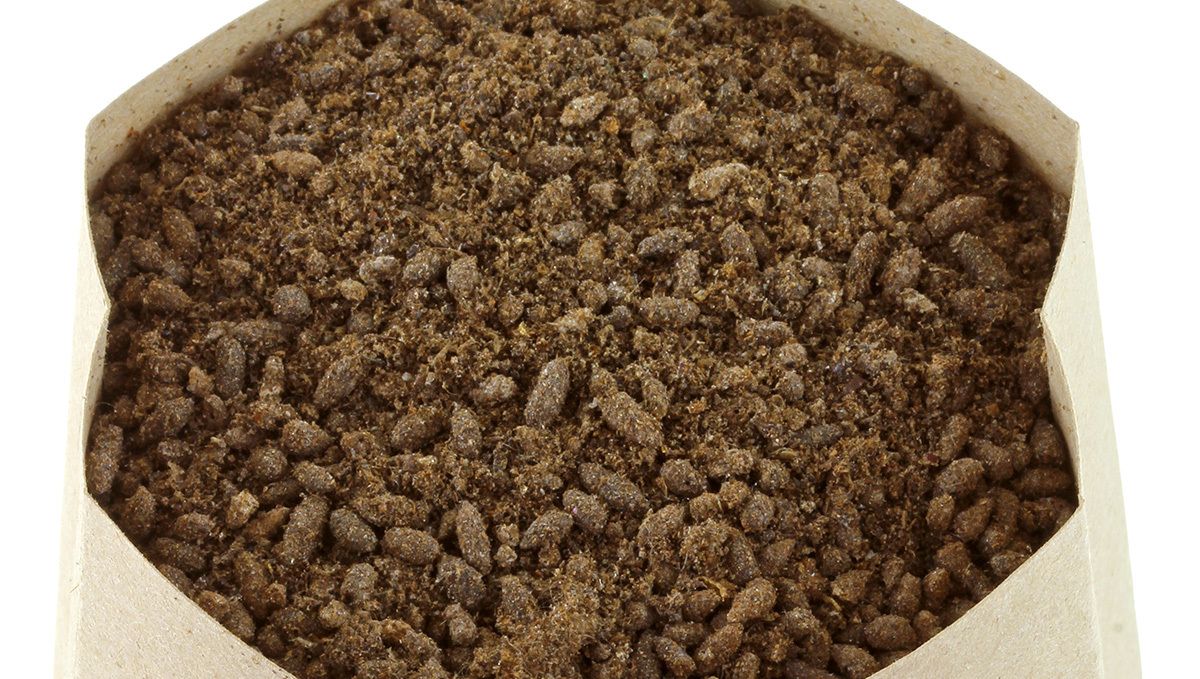
Be careful with the amount you introduce to the substrate, as bat guano is pretty strong stuff. A little goes a very long way.
It can be used in both its fresh or dry form and is typically sourced in either powder or pellet form. It can be used in many ways other than as a direct additive to the soil. Many cultivators used bat guano as a fertilizing tea, or as a foliar spray. It can also be used as a top dressing by sprinkling it directly around the base of the plant and then watered in. To make a super effective bat guano tea all you need is 15 grams of bat guano, 1 liter of lukewarm water, and an air pump. Mix the guano and the water together well, and make sure the water is only lukewarm. Hot water will kill the microbial life that you are trying to introduce to the mix. Give it all a good mix, throw the pump in and let it aerate for at least 24 hours. This tea can be supplied twice a week throughout the entire lifecycle of the crop.
Worm Castings
Worm casting, or worm poo, is literally the most bio-available organic fertilizer with ridiculous levels of both nutrients and minerals. Also referred to as vermicast, this top-shelf additive is perfect for any organic cannabis garden. It not only provides long-lasting, slow-release nutrition to the crop but also increases the aeration of the soil and provides excellent drainage.
You can swap out any potting mix you may use for 100% worm castings, and you do not have to worry about nutrient burn issues at all. Creating your own worm farm at home is super simple and can provide you with an unlimited supply of castings, ready to use at a moments notice, and provide your crop with almost everything it needs to provide you with bumper harvests.
Worm castings also contain humus. This crucial substance is the end result of soil decomposition and contains all of the necessary elements for optimal plant growth, including nitrogen, phosphorus, sulphur, calcium, potassium, and magnesium. Humus also helps to improve soil health by contributing to aeration and drainage. Worm castings are also packed with beneficial microbes. Certain forms of bacteria live within the gut of worms and end up in the castings that come out of the other end. You can look at worm castings as a form of inoculant that will fill your soil with good microbes. While you can focus your efforts on building and maintaining a worm bin, earthworms also live out in nature. You can attract them to your garden to deposit worm castings with minimal effort; just lay down a thin layer of grass clippings, dead leaves, or straw and they’ll show up in no time at all.
Manure
Cow manure makes a perfect slow-release fertilizer. It usually contains a very well-balanced mix of the three main macronutrients that plants need for healthy and vigorous growth, plus manure works as a very efficient soil conditioner and helps increase the amount of microbial life in the soil, while also boosting moisture retention. Keep in mind that some manures may have herbicide contamination, so always check the packaging to ensure it is fully organic. If you live near a farm and can get it directly from the source then even better!
You want to mix the manure in before planting, and make sure there is no heavy rain forecast for the next week or so to prevent the chances of all the goodness being washed away. Chicken manure, on the other hand, is considered to be “hot” manure, meaning it can easily burn the plants if not allowed to sit and mature. In general, we do not recommend using chicken manure for your cannabis crop.
Bone Meal and Blood Meal
Bone meal is made from the ground-up bones of beef cattle and is a fantastic source of both phosphorus and calcium. It is used pretty extensively with outdoor cannabis cultivation but is not recommended for indoor growers. It does come with quite an acidic pH level which needs to be balanced, so keep that in mind. Blood meal is made from, you guessed it, the blood of beef cattle. It is very rich in bio-available nitrogen, but can also easily burn the plants if overused.
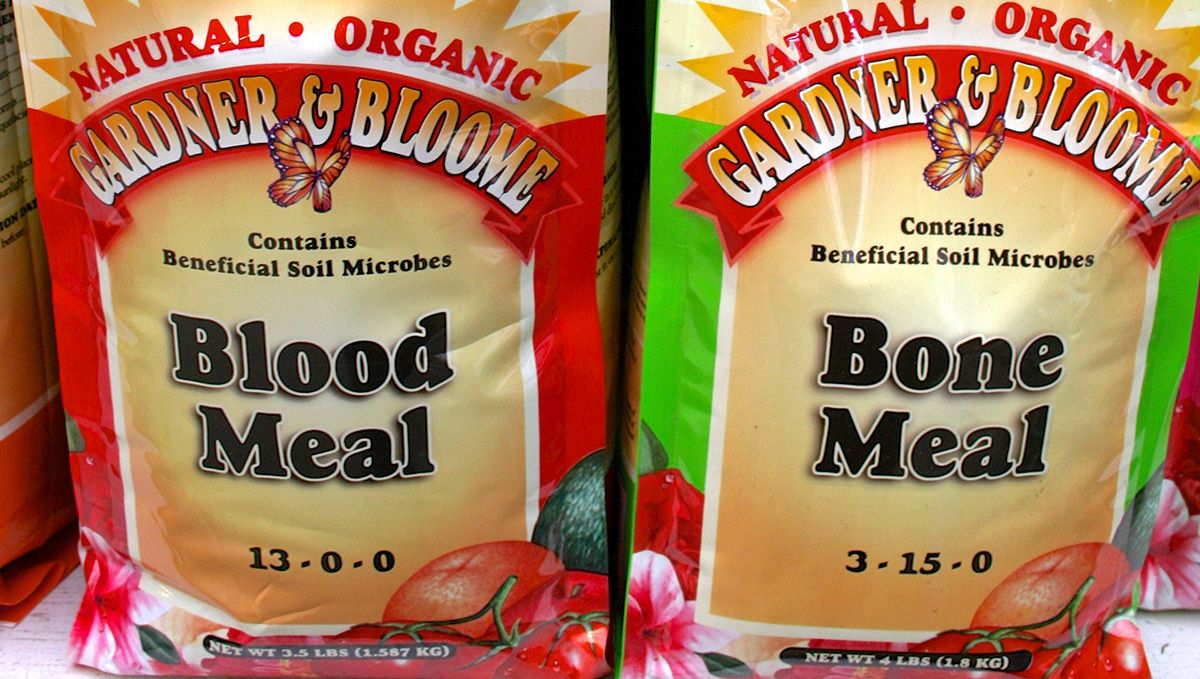
It too comes with quite an acidic pH level which must be balanced. Both of these additives can attract the attention of wild animals which can easily wreck the crop, so make sure any plants that use these amendments are well fenced off. It goes without saying that these additives are anything but vegan, so if that is important for you then choose other fertilizing options.
Kelp Meal
Kelp meal is one of the most desirable additives for cannabis crops, as it is packed full of over 65 different essential elements and minerals, and also contains a very healthy dose of potassium. Many growers are of the thinking that kelp meal provides a huge boost to the flavor and color range of cannabis, which we agree with.
Mycorrhizal Fungi
Every single cannabis crop, no matter the method or techniques applied, should have mycorrhizal fungi added. This type of fungi plays a very important role in helping the plant feed on the nutrients by turning them into a more bio-available source. They also help protect the root system from attack by pests, disease, and harmful fungi.
2. Other Additives That Improve Soil Quality
One of the downsides to using soil found in the ground is that it can be very dense once watered. Restricting root growth during the early stages of a Cannabis plant’s life is never advised, so adding other substrates into your living soil can be very advantageous.
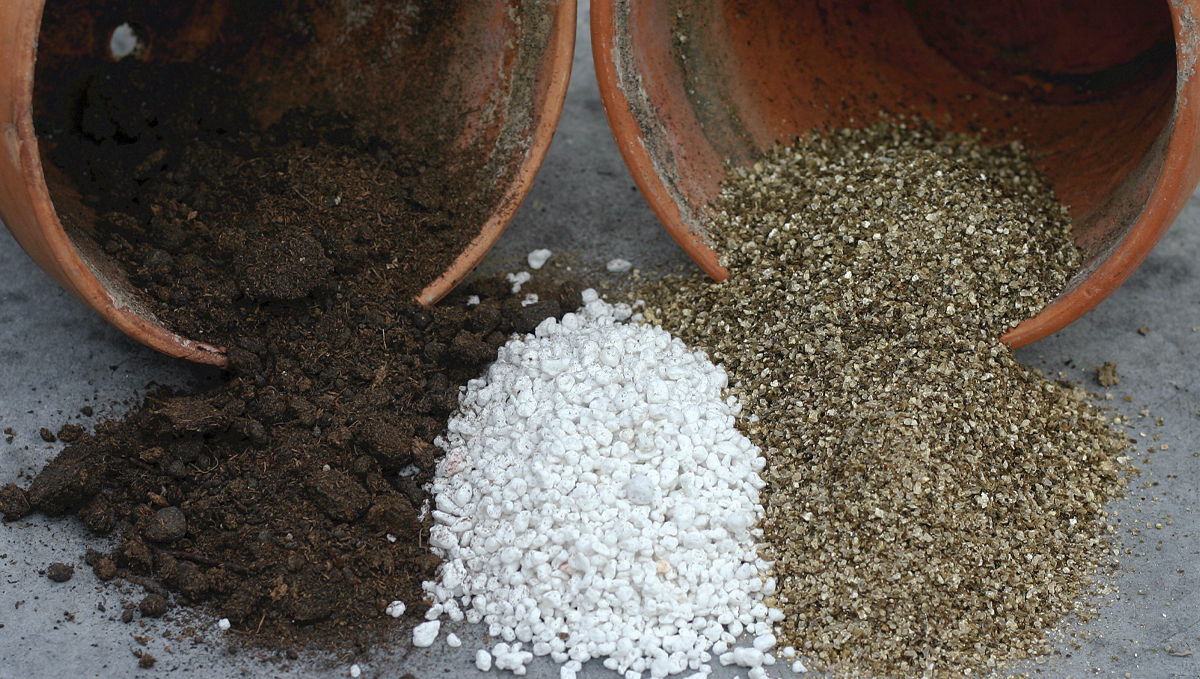
Coco
By simply adding a 25-50% ratio of coco coir to your cannabis soil, the quality of the mix will become very airy and lightweight. Adding coco will enhance the air pockets present, the wicking action of the medium, as well as encourage a mass expansion in the rhizosphere. Coco is very user-friendly and is well associated with large yields. The best thing about adding coco is the fact it is an inert growing medium, so does not have any nutritional value in terms of Nitrogen, Phosphorus, or Potassium, including trace elements.
Pros
- Increases aeration and holds water better: Due to its characteristics, coco fiber can increase aeration in the soil and can absorb up to 10x its own weight in water, making it vital for growers living in dry weather.
- Cheap: Coco fiber is relatively cheap and comes in various forms. You can find it compressed into a brick or already washed and ready to use out the bag, the price may change a bit depending on your preference but it won’t be absurdly expensive.
- Easy to use: Coco is a sterile medium so fungus and other bugs avoid it, making it perfect for growing cannabis. Also, because of its neutral pH, you can use it with soil amendments without worrying.
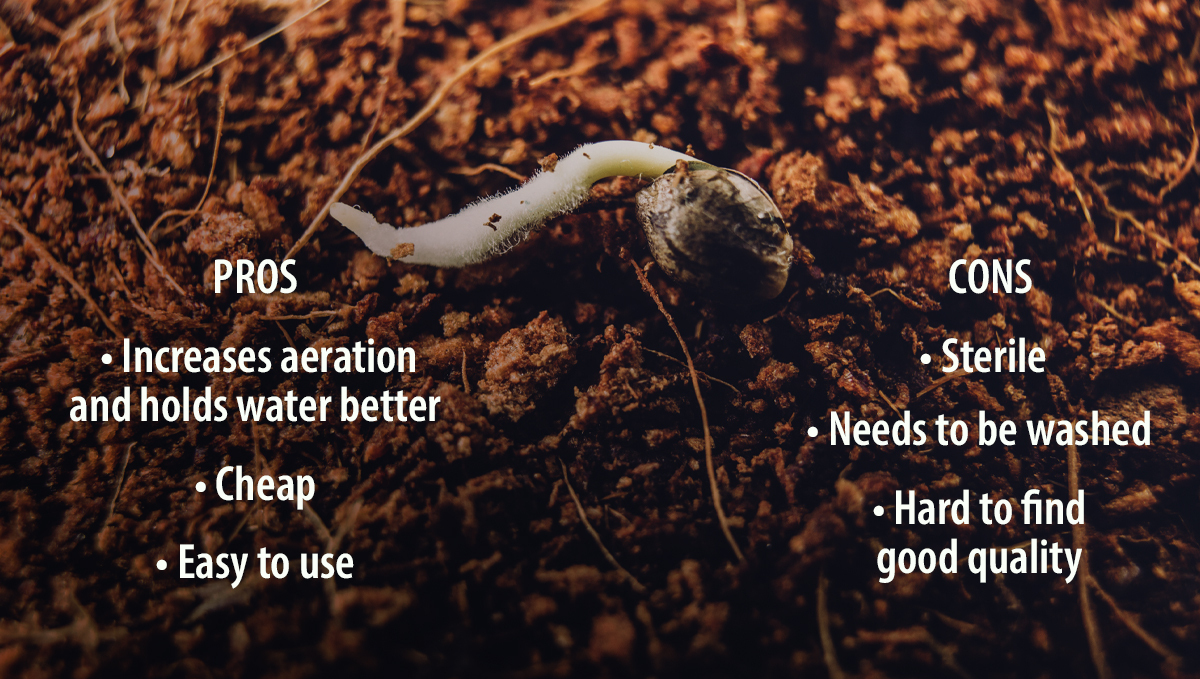
Cons
- Sterile: Because this type of medium is sterile, it won’t contain any of the nutrients your plant needs, even though you can mix it with soil or even amend it, you will have to provide all the nutrients your plant needs if you’re only using coco.
- Needs to be washed: The quality can vary from brand to brand, so depending on the brand, you will have to soak it and wash it a couple of times to remove impurities before using it.
- Hard to find good quality: Even though it’s relatively easy to find coco coir, it can be hard to find good quality coco fiber. This doesn’t mean you can’t use it but you will have to wash it thoroughly and experiment with a couple of brands before you’re 100% satisfied.
Biochar
An incredible organic addictive that has amazing water-holding capabilities, an enormous surface area, and is a source of pure carbon. Biochar is made by heating wood to such temperatures that the end result is a tiny, charcoal-black crystalline substrate. Due to the fact it is 100% carbon and has a shelf life of thousands of years, organic farmers use biochar with their soil to improve water retention allowing for less watering times, feeding the beneficial microorganisms a rich source of carbon, and helping save the planet.
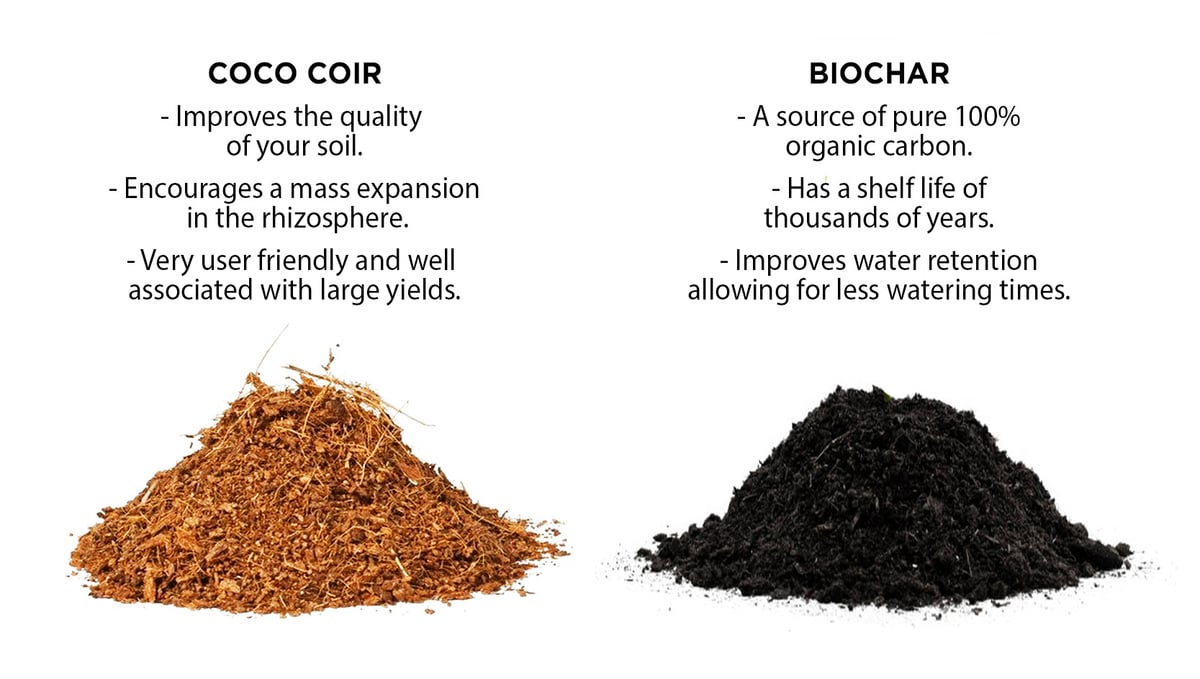
Pros
- Increases soil fertility: Biochar can boost soil fertility when used in combination with amended soil because it prevents nutrients from leaking out and provides carbon which increases the availability of nutrients in the medium.
- Holds nutrients and moisture: Thanks to its porous surface, biochar can absorb a lot of water and draws in minerals which are essential for plant development.
- Reduces the need for fertilizers: Because biochar is carbon-rich, it accelerates the decomposition of organic matter which results in more nutrients being available in the medium, a perfect choice for organic growers.
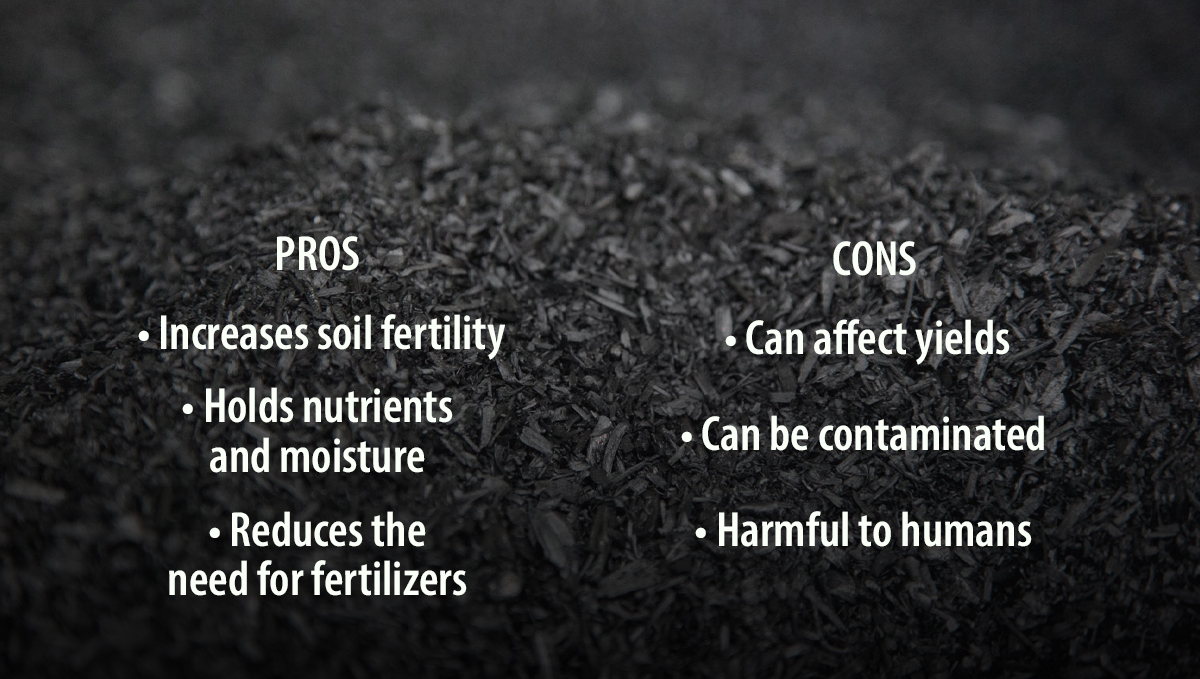
Cons
- Can affect yields: Due to the porous characteristic, biochar can absorb too much water and nutrients when used in excess and can end up stressing your autoflowering plants which will show signs of deficiencies.
- Can be contaminated: The quality of biochar is influenced by the material it is made of, so it can come contaminated with heavy metals or harmful compounds that are bad for your autoflowering plants.
- Harmful to humans: If not dealt with caution, you can end up breathing ash which is a concern if exposed to daily, also, it can irritate you if it comes in contact with your eyes or skin for a long period of time.
Perlite
Perlite is usually used in soil mixes to increase aeration and improve the soil’s texture, by using perlite in the proper amounts you will not only improve drainage but also avoid compaction, making it a better medium for the roots to grow in. Usually, perlite is used in combination with coco fiber and soil to provide the best medium for the roots, while perlite improves aeration, coco fiber absorbs water, balancing those two elements in the best ratio possible.
Perlite can also be used to plant clones in, when you place your cuttings in perlite, the roots usually grow stronger and faster because they need oxygen to thrive and perlite helps provide it.
Pros
- Increased aeration: Perlite creates small air pockets in the soil so if used properly, it can improve the growth rate.
- Sterile medium: Because it’s a sterile medium, perlite won’t affect the pH of your medium or increase the amount of minerals in it.
- Avoids soil compaction: Perlite needs to be thoroughly mixed in the soil before using, this will create several air pockets that make the soil fluffier, avoiding compaction.
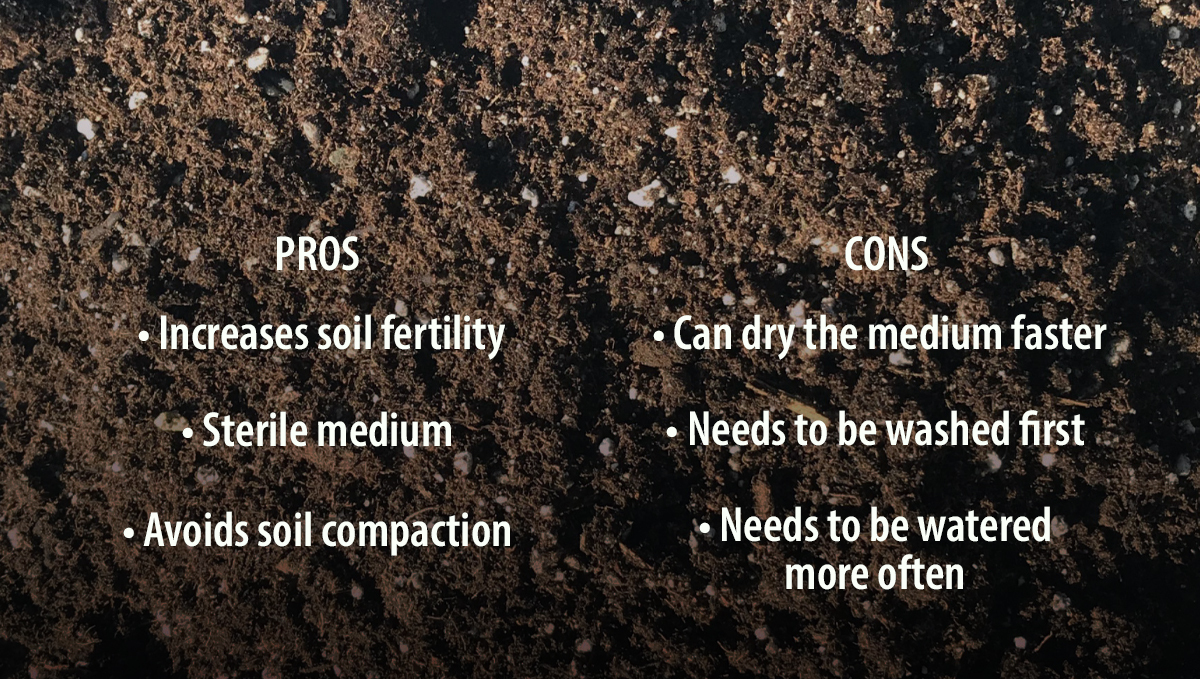
Cons
- Can dry the medium faster: You will need to check your autoflowering plants closely because with more oxygen in the soil you will have to water more often.
- Needs to be washed first: If the brand you’re using does not pre-wash the perlite, it may come with a fine dust that can be harmful if inhaled so we recommend washing your perlite before using.
- Needs to be watered more often: Because the medium will dry faster, you will need to water more and this means you will need to check on your autoflowering plants at least 2 times per day to make sure everything goes accordingly.
Vermiculite
Vermiculite can be used to improve the quality of your soil, just like perlite, vermiculite has several qualities that will make your autoflowering plants grow better and faster. This mineral helps aerate the soil, holds water and nutrients while not being toxic or changing the pH.
If your soil is compact or does not drain water properly, you can add vermiculite to provide the roots a better medium to grow in, just make sure you’re using the proper ratio because too much can hold a lot of nutrients and water and end up harming your autoflowering plants.
Pros
- Neutral pH: Because it’s a sterile medium, vermiculite will not alter your soil’s pH so there’s no need to worry about checking the runoff every day.
- Can prevent mold: When used in the proper ratio, vermiculite will absorb the excess water, preventing mold and fungus in the soil.
- Improves soil quality: Just like perlite, vermiculite improves the soil’s texture and makes it fluffier, preventing soil compaction.
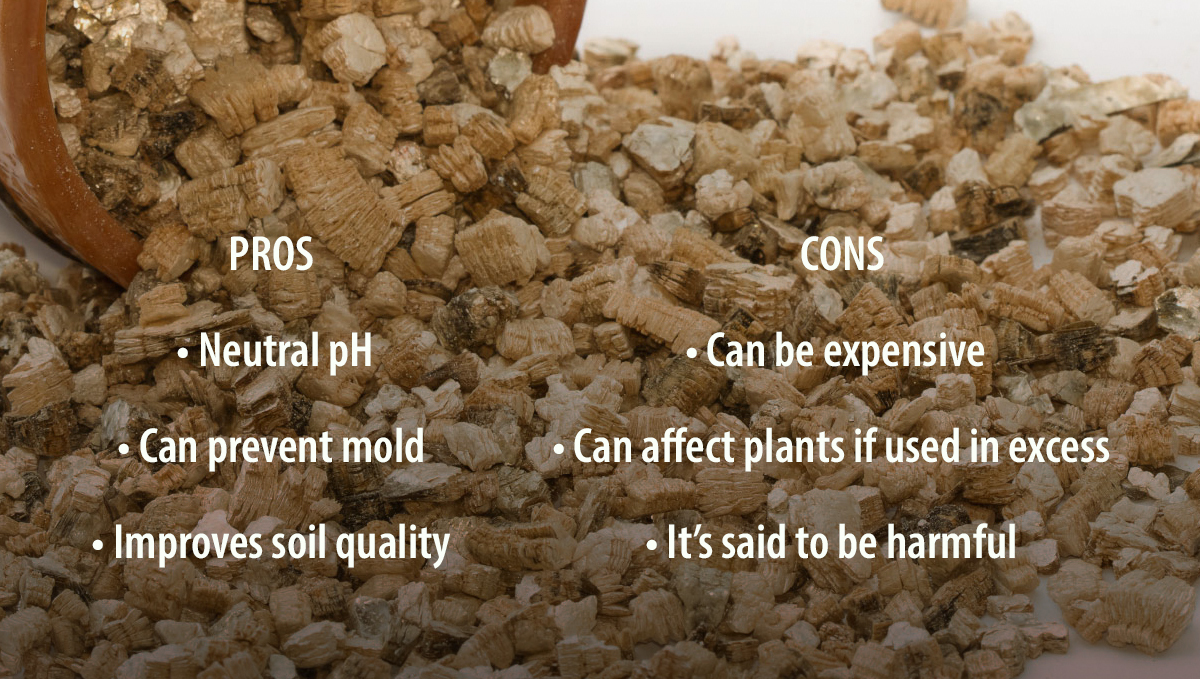
Cons
- Can be expensive: Depending on where you live, vermiculite can be relatively hard to find and a bit expensive because it’s not usually found in regular grow shops.
- Can affect autoflowering plants if used in excess: Because perlite holds nutrients and water, using it in excess can ultimately result in overwatering and overfeeding.
- It’s said to be harmful: When buying low-quality vermiculite, it can contain asbestos and can cause lung problems. Inhaling these tiny fibers can cause asbestosis, mesothelioma, and lung cancer if exposed for a long time so it’s essential to buy the best quality possible and wash it before using it.
3. Signs of Good Soil
Due to the process in which soil is naturally produced, there are a few factors to consider if you are going to prepare your own. If buying soil from a well-known brand, or your local garden center’s cheap and cheerful products then there are some things to consider.
- Check the packaging to see the nutritional value of the soil. A good brand will take the time to display a soil nutrient analysis displaying-N-P-K values, amount of perlite, vermiculite, compost, trace elements, and the bacterial and fungi count present.
- Worms aerate the soil as they crawl through eating up organic matter. If you see your soil full of worms then do not worry. Not only will these little helpers aerate the soil but will release beneficial bacteria from their gut as they do.
- Good store-bought soil will have perlite or coco added allowing for the ideal balance of air to water retention. Avoid soils that do not have any perlite unless you are purposely buying pure worm castings.
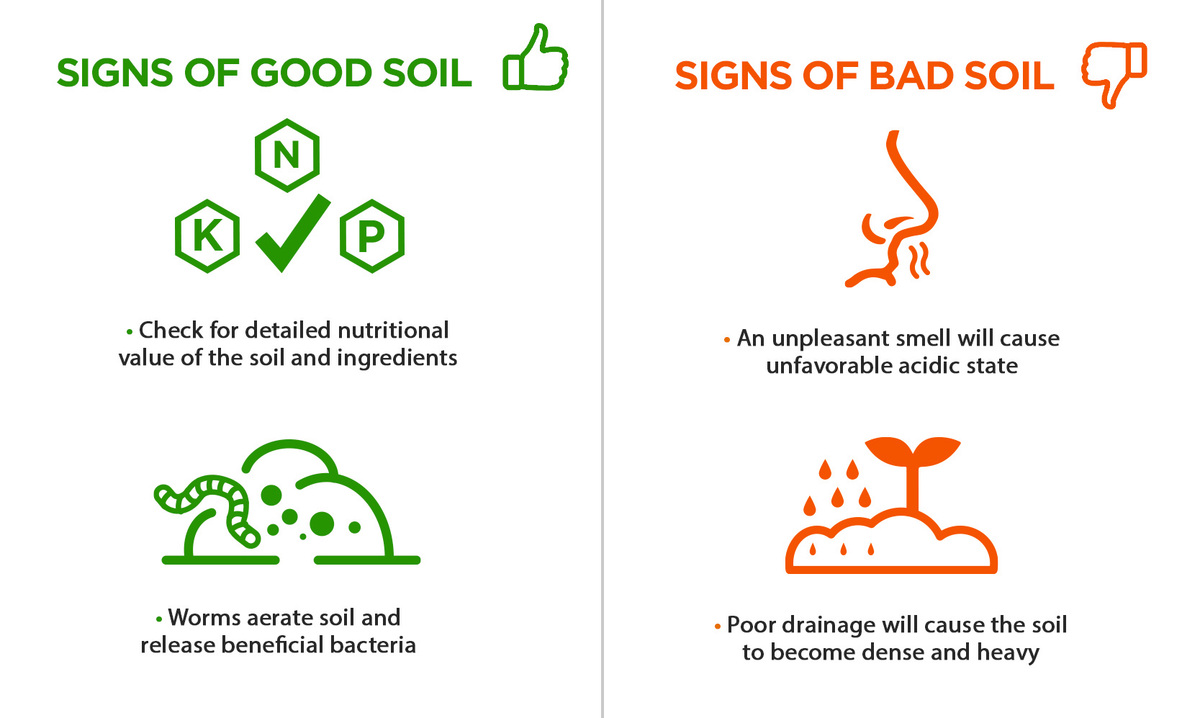
4. Signs of Bad Soil
- Bad soil will have an unpleasant smell which is a red flag bad bacteria are present, causing the medium to be in an unfavorable acidic state.
- Drainage will be poor, causing the soil to become dense and heavy. This weight can restrict root growth and slow plant development down dramatically. The ratio of water retention, drainage, and wicking capabilities will all be out of balance.
5. How to make your own soil
To make your own soil mix you need to have in mind the conditions that you will have during your growing cycle, things like temperature and humidity may have an influence in the best mix, so make sure you know the conditions before mixing your soil.
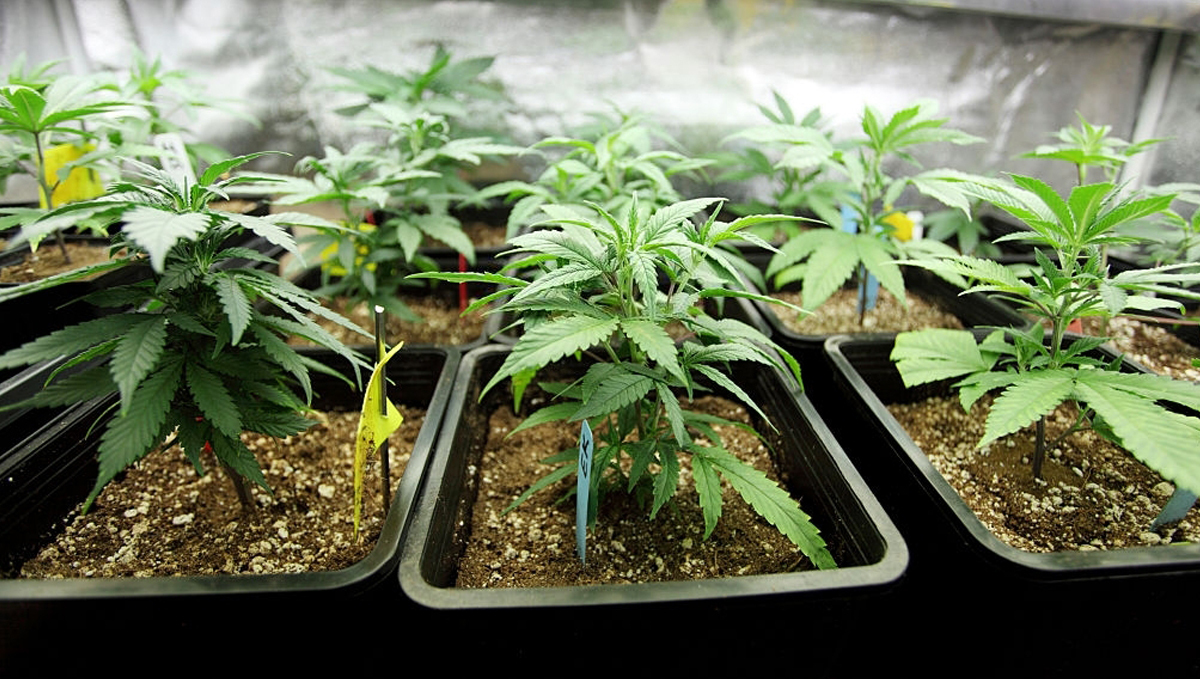
Best nutrients for soil
We recommend always using organic nutrients when growing in soil because soil it’s organic matter and contains microorganisms that can greatly benefit your autoflowering plants if taken care of properly. We cannot recommend a certain brand or organic nutrients line but as long as you’re using high-quality organic nutrients and use them appropriately, you’ll be fine. Just make sure the nutrients are 100% organic and keep an eye on the pH level because a drastic increase or decrease can ultimately kill the microorganisms present in your soil.
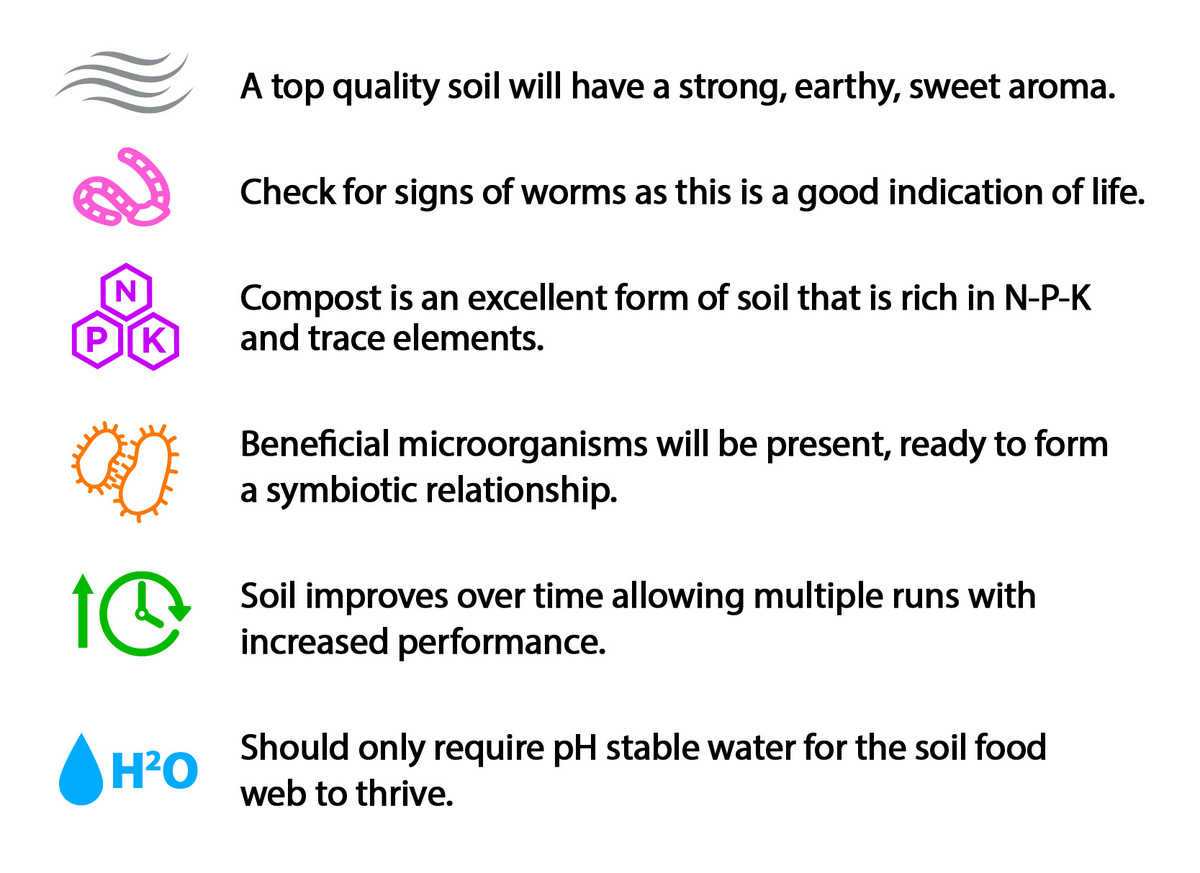
Cheap mix for DIY soil
Even though you can find organic nutrients in your local grow shops, they can be quite expensive so if you’re on a budget there are good alternatives that are relatively cheap.
There are several other methods to make your own organic nutrients such as KNF and Bokashi.
Depending on the space you have available, you can try composting or vermicomposting, these methods allow you to make your own tailored organic soil that will provide everything you need without spending too much.
Best soil for beginners
If you’re a beginner grower and don’t know exactly how things work, here is a general soil recipe that will work fantastically in almost all types of weathers, just remember that as time passes and you get more experienced, it’s ideal you adjust it to your specific needs.
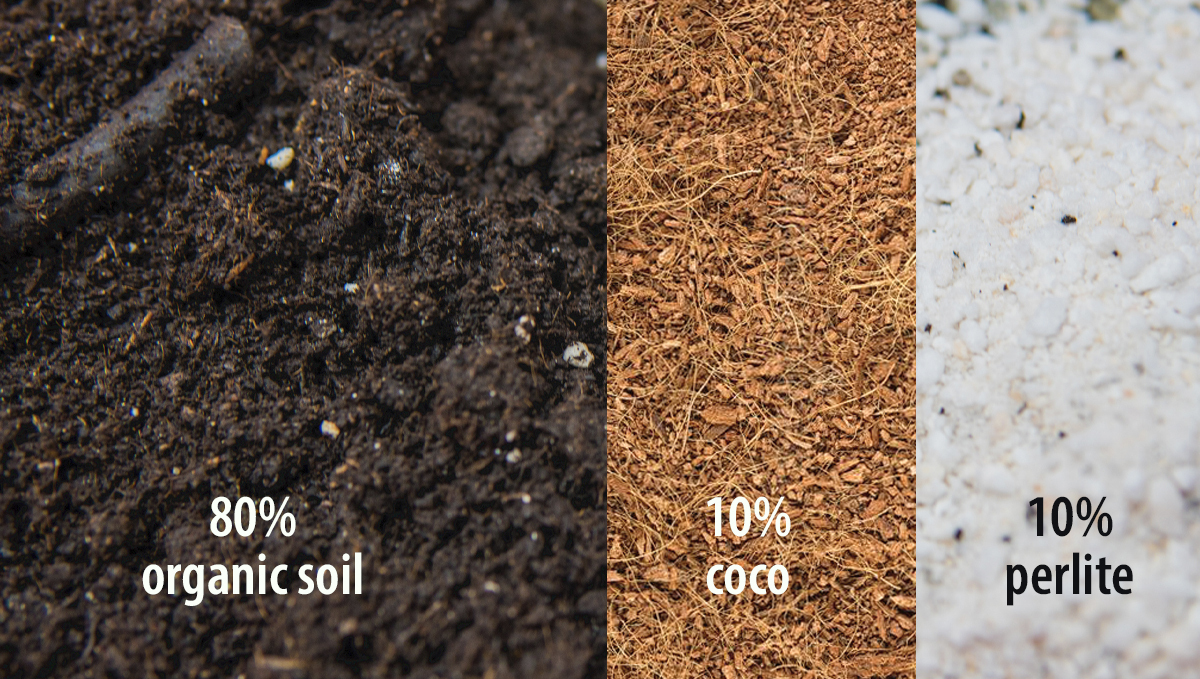
General DIY soil recipe mix:
- 80% organic soil
- 10% perlite
- 10% coco fiber
Remember that you can and should tweak it to your needs, but as long as you maintain a similar ratio your autoflowering plants will grow exceptionally.
PH too high or pH too low
If the pH of your medium is too high or too low, you should check the nutrient solution you’re feeding, have in mind that most additives are sterile and neutral so if you’re experiencing pH problems you should check the water source and nutrient solution.
Best soil for marijuana
The best soil mix for autoflowers or best marijuana soil, in general, will depend on the weather you have throughout your grow cycle, by following the table you can easily choose the one that better suits you.
| Advantages of soil additives when growing autoflowering plants | ||
|---|---|---|
| Additive | When to use | Advantages |
| Coco fiber | Use in dry environments or to improve soil quality. | Holds water and helps avoid soil compaction. |
| Biochar | Use in dry climates or when growing in organic soil. | Improve water retention and helps decompose nutrients faster. |
| Perlite | Used to help aerate the soil in humid environments. | Helps dry the soil faster and increases aeration. |
| Vermiculite | Used in dry environments, helps keep the soil moist. | Improves soil quality and helps keep it moist. |
As a general rule, you should always use 70-80% of organic soil mixed with the additive of your choice, always have in mind to use additives with different properties, for example, vermiculite shouldn’t be used with coco fiber because both absorb a lot of water and can cause overwatering.
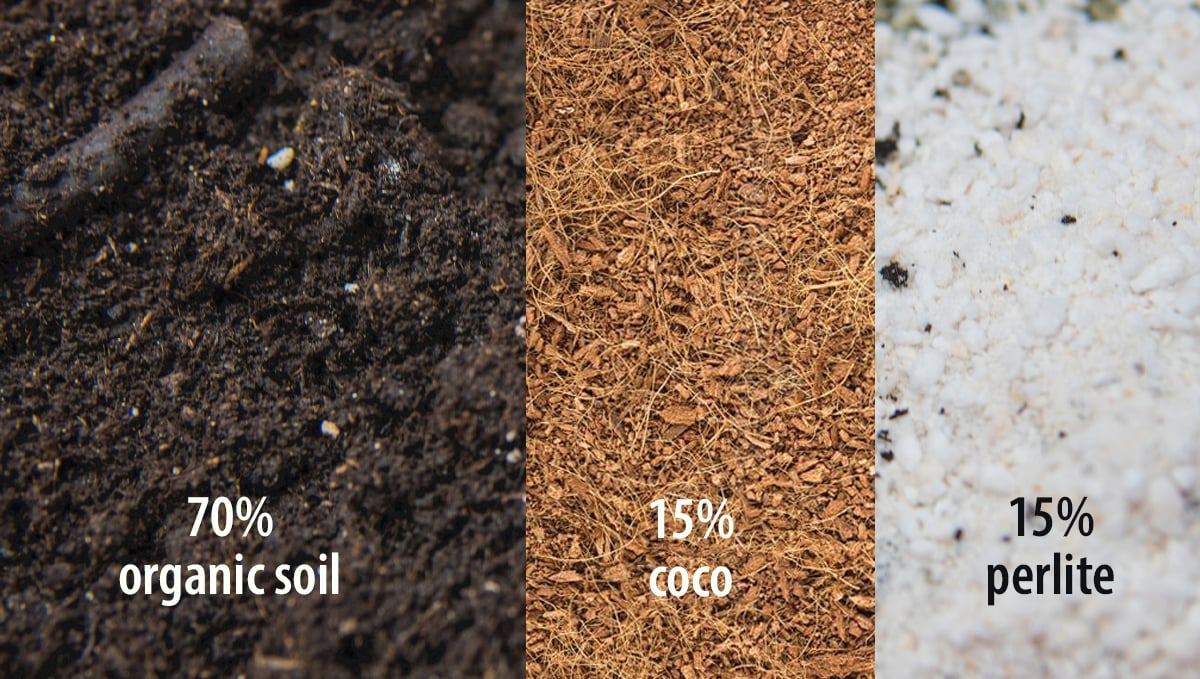
- 70% organic soil
- 15% perlite
- 15% coco fiber or 15% biochar or 15% vermiculite
For the best soil for autoflower plants, we recommend using 70-80% organic soil mixed with 15% perlite and 15% coco fiber, or substituting coco for vermiculite or biochar, always respecting their properties to avoid having oxygen or water in excess. Remember that for the best growing medium for autoflowers, you should be on the lookout for the tips your plants give you and adjust the ratio if needed.
6. In conclusion
There isn't a best soil for weed, in general, having all of the nutrients covered is one-half of a top-quality soil for marijuana, however, it should also have the ideal ratio of drainage, air pockets, and wicking action so we recommend looking into super soil for autoflowers.
Once you have found the ultimate balance, you can now confidently re-use your organic growing medium for multiple crops with the understanding the more time the living soil food web has to develop, the greater the results in terms of plant performance and yields.
EXTERNAL REFERENCES
- Soil Physics, Soil Conservation, Soil Quality, Soil Compaction, Runoff Modelling, Soil Loss Tolerance - Hadda, Manjit. (2020).
- Soil Health - Loehrlein, Marietta. (2020).
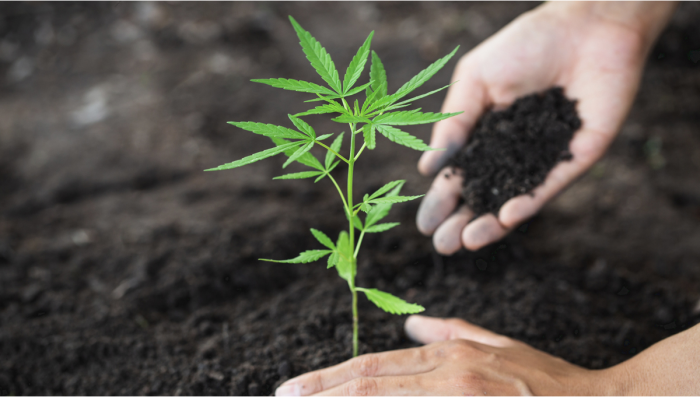







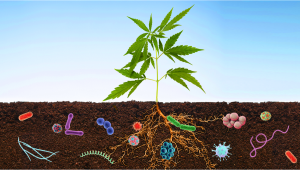
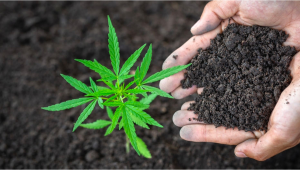

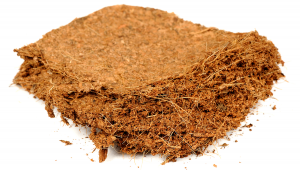
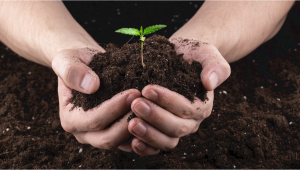


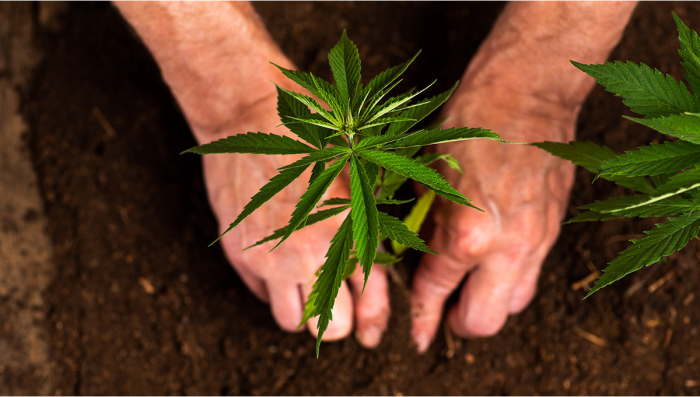
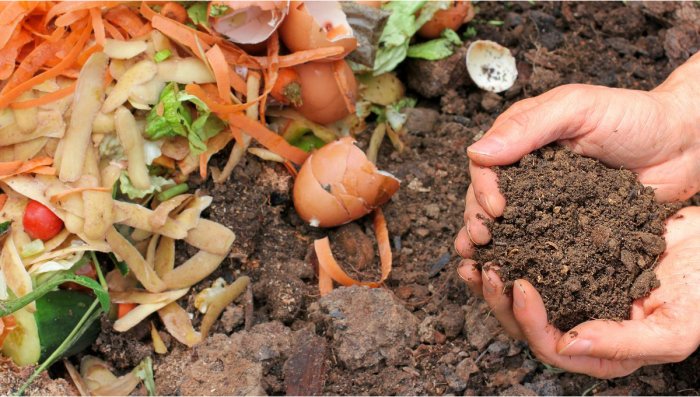
Comments